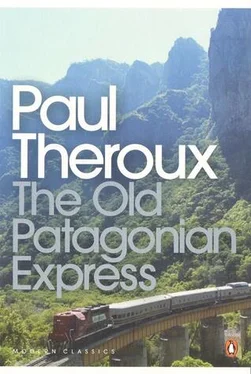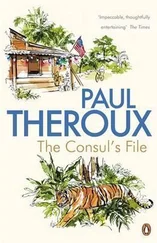Paul Theroux - The Old Patagonian Express - By Train Through the Americas
Здесь есть возможность читать онлайн «Paul Theroux - The Old Patagonian Express - By Train Through the Americas» весь текст электронной книги совершенно бесплатно (целиком полную версию без сокращений). В некоторых случаях можно слушать аудио, скачать через торрент в формате fb2 и присутствует краткое содержание. Год выпуска: 2008, Издательство: Penguin Books Ltd, Жанр: Путешествия и география, на английском языке. Описание произведения, (предисловие) а так же отзывы посетителей доступны на портале библиотеки ЛибКат.
- Название:The Old Patagonian Express: By Train Through the Americas
- Автор:
- Издательство:Penguin Books Ltd
- Жанр:
- Год:2008
- ISBN:нет данных
- Рейтинг книги:5 / 5. Голосов: 1
-
Избранное:Добавить в избранное
- Отзывы:
-
Ваша оценка:
- 100
- 1
- 2
- 3
- 4
- 5
The Old Patagonian Express: By Train Through the Americas: краткое содержание, описание и аннотация
Предлагаем к чтению аннотацию, описание, краткое содержание или предисловие (зависит от того, что написал сам автор книги «The Old Patagonian Express: By Train Through the Americas»). Если вы не нашли необходимую информацию о книге — напишите в комментариях, мы постараемся отыскать её.
The Old Patagonian Express: By Train Through the Americas — читать онлайн бесплатно полную книгу (весь текст) целиком
Ниже представлен текст книги, разбитый по страницам. Система сохранения места последней прочитанной страницы, позволяет с удобством читать онлайн бесплатно книгу «The Old Patagonian Express: By Train Through the Americas», без необходимости каждый раз заново искать на чём Вы остановились. Поставьте закладку, и сможете в любой момент перейти на страницу, на которой закончили чтение.
Интервал:
Закладка:
There was no carpet on the floor to trip the blind man. no intrusive furniture he could barge into. The parquet floor gleamed; there was not a speck of dust anywhere. The paintings were amorphous, but the three steel engravings were precise. I recognized them as Piranesi's 'Views of Rome'. The most Borges-like one was 'The Pyramid of Ces-tius' and could have been an illustration from Borges' own Ficciones. Piranesi's biographer Bianconi called him 'the Rembrandt of the ruins'. 'I need to produce great ideas,' said Piranesi. 'I believe that were I given the planning of a new universe I would be mad enough to undertake it.' It was something Borges himself might have said.
The books were a mixed lot. One corner was mostly Everyman editions, the classics in English translation — Homer, Dante, Virgil. There were shelves of poetry in no particular order — Tennyson and E.E. Cum-mings, Byron, Poe, Wordsworth, Hardy. There were reference books, Harvey's English Literature, The Oxford Book of Quotations, various dictionaries — including Doctor Johnson's — and an old leatherbound encyclopaedia. They were not fine editions; the spines were worn, the cloth had faded; but they had the look of having been read. They were well-thumbed, they sprouted paper page-markers. Reading alters the appearance of a book. Once it has been read, it never looks the same again, and people leave their individual imprint on a book they have read. One of the pleasures of reading is seeing this alteration on the pages, and the way, by reading it, you have made the book yours.
There was a sound of scuffing in the corridor, and a distinct grunt. Borges emerged from the dimly-lighted foyer, feeling his way along the wall. He was dressed formally, in a dark blue suit and dark tie; his black shoes were loosely tied, and a watch chain depended from his pocket. He was taller than I had expected, and there was an English cast to his face, a pale seriousness in his jaw and forehead. His eyes were swollen, staring, and sightless. But for his faltering, and the slight tremble in his hands, he was in excellent health. He had the fussy precision of a chemist. His skin was clear — there were no age-blotches on his hands — and there was a firmness in his face. People had told me he was 'about eighty'. He was then in his seventy-ninth year, but he looked ten years younger. 'When you get to my age,' he tells his double in the story The Other', 'you will have lost your eyesight almost completely. You'll still make out the colour yellow and lights and shadows. Don't worry. Gradual blindness is not a tragedy. It's like a slow summer dusk.'
'Yes,' he said, groping for my hand. Squeezing it, he guided me to a chair. 'Please sit down. There's a chair here somewhere. Please make yourself at home.'
He spoke so rapidly that I was not aware of an accent until he had finished speaking. He seemed breathless. He spoke in bursts, but without hesitation, except when starting a new subject. Then, stuttering, he raised his trembling hands and seemed to claw the subject out of the air and shake ideas from it as he went on.
'You're from New England,' he said. That's wonderful. That's the best place to be from. It all began there- Emerson, Thoreau, Melville, Hawthorne, Longfellow. They started it. If it weren't for them there would be nothing. I was there- it was beautiful.'
'I've read your poem about it,' I said. Borges' 'New England 1967' begins, 'They have changed the shapes of my dream. . '
'Yes, yes,' he said. He moved his hands impatiently, like a man shaking dice. He would not talk about his work; he was almost dismissive. 'I was lecturing at Harvard. I hate lecturing -1 love teaching. I enjoyed the States — New England. And Texas is something special. I was there with my mother. She was old, over eighty. We went to see the Alamo.' Borges' mother had died not long before, at the great age of ninety-nine. Her room is as she left it in death. 'Do you know Austin?'
I said I had taken the train from Boston to Fort Worth and that I had not thought much of Fort Worth.
'You should have gone to Austin,' said Borges. 'The rest of it is nothing to me — the mid-West, Ohio, Chicago. Sandburg is the poet of Chicago, but what is he? He's just noisy — he got it all from Whitman. Whitman was great, Sandburg is nothing. And the rest of it,' he said, shaking his fingers at an imaginary map of North America. 'Canada? Tell me, what has Canada produced? Nothing. But the South is interesting. What a pity they lost the Civil War — don't you think it is a pity, eh?'
I said I thought defeat had been inevitable for the South. They had been backward-looking and complacent, and now they were the only people in the States who ever talked about the Civil War. People in the North never spoke of it. If the South had won, we might have been spared some of these Confederate reminiscences.
'Of course they talk about it,' said Borges. 'It was a terrible defeat for them. Yet they had to lose. They were agrarian. But I wonder — is defeat so bad? In The Seven Pillars of Wisdom, doesn't he say something about "the shamefulness of victory"? The Southerners were courageous, but perhaps a man of courage does not make a good soldier. What do you think?'
Courage alone could not make you a good soldier, I said, not any more than patience alone could make you a good fisherman. Courage might make a man blind to risk, and an excess of courage, without caution, could be fatal.
'But people respect soldiers,' said Borges. 'That's why no one really thinks much of the Americans. If America were a military power instead of a commercial empire, people would look up to it. Who respects businessmen? No one. People look at America and all they see are travelling salesmen. So they laugh.'
He fluttered his hands, snatched with them, and changed the subject. 'How did you come to Argentina?'
'After Texas, I took the train to Mexico.'
'What do you think of Mexico?'
'Ramshackle, but pleasant.'
Borges said, 'I dislike Mexico and the Mexicans. They are so nationalistic. And they hate the Spanish. What can happen to them if they feel that way? And they have nothing. They are just playing — playing at being nationalistic. But what they like especially is playing at being Red Indians. They like to play. They have nothing at all. And they can't fight, eh? They are very poor soldiers — they always lose. Look what a few American soldiers could do in Mexico! No, I don't like Mexico at all.'
He paused and leaned forward. His eyes bulged. He found my knee and tapped it for emphasis.
'I don't have this complex,' he said. 'I don't hate the Spanish. Although I much prefer the English. After 1 lost my sight in 1955 I decided to do something altogether new. So I learned Anglo-Saxon. Listen-'
He recited the entire Lord's Prayer in Anglo-Saxon.
'That was the Lord's Prayer. Now this — do you know this?'
He recited the opening lines of The Seafarer.
'The Seafarer,' he said. 'Isn't it beautiful? I am partly English. My grandmother came from Northumberland, and there are other relatives from Staffordshire. 'Saxon and Celt and Dane" — isn't that how it goes? We always spoke English at home. My father spoke to me in English. Perhaps I'm partly Norwegian — the Vikings were in Northumberland. And York — York is a beautiful city, eh? My ancestors were there, too.'
'Robinson Crusoe was from York,' I said.
'Was he?'
' "I was born in the year something-something, in the city of York, of a good family. ."'
'Yes, yes, I had forgotten that.'
I said there were Norse names all over the north of England, and gave as an example the name Thorpe. It was a place-name and a surname.
Borges said, 'Like the German dorf?
'Or Dutch dorp.’
‘This is strange. I will tell you something. I am writing a story in which the main character's name is Thorpe.'
Читать дальшеИнтервал:
Закладка:
Похожие книги на «The Old Patagonian Express: By Train Through the Americas»
Представляем Вашему вниманию похожие книги на «The Old Patagonian Express: By Train Through the Americas» списком для выбора. Мы отобрали схожую по названию и смыслу литературу в надежде предоставить читателям больше вариантов отыскать новые, интересные, ещё непрочитанные произведения.
Обсуждение, отзывы о книге «The Old Patagonian Express: By Train Through the Americas» и просто собственные мнения читателей. Оставьте ваши комментарии, напишите, что Вы думаете о произведении, его смысле или главных героях. Укажите что конкретно понравилось, а что нет, и почему Вы так считаете.












